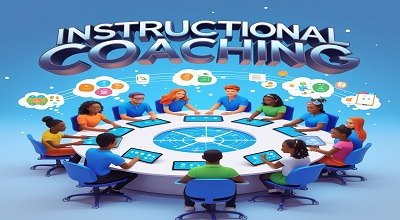Instructional Coaching
Instructional coaching has become a cornerstone of professional development in education. As we progress through 2025, the landscape of instructional coachings continues to evolve, integrating new methodologies, technologies, and a deeper understanding of diverse learner needs. This article delves into the current state of instructional coachings, highlighting innovative practices and real-world applications that are shaping the future of education.
Defining Instructional Coaching
Instructional coaching is a collaborative process in which a coach works alongside educators to enhance teaching practices, improve student outcomes, and foster a culture of continuous learning. Unlike traditional professional development, instructional coaching is sustained, personalized, and embedded within educators’ daily routines.
The Evolution of Instructional Coaching
Historically, professional development in education was often episodic and disconnected from classroom practice. Instructional coaching emerged as a response to this gap, offering ongoing, job-embedded support. Over the years, coaching has expanded to include various models and approaches, adapting to the changing needs of educators and students.
Key Components of Effective Instructional Coaching
Effective instructional coachings encompasses several key components:
- Goal Setting: Collaboratively setting clear, measurable goals aligned with student outcomes.
- Observation and Feedback: Regular classroom observations followed by constructive feedback.
- Co-Planning: Joint planning sessions to design lessons and instructional strategies.
- Reflection: Opportunities for educators to reflect on their practices and growth.
- Sustained Support: Ongoing coaching relationships that provide continuous support.
Instructional Coaching Models
Several models of instructional coaching are prevalent in 2025:
- The Impact Cycle: Developed by Jim Knight, this model emphasizes a structured process of setting goals, planning, teaching, and reflecting.
- Student-Centered Coaching: Focuses on aligning coaching efforts with student data and learning outcomes.
- Peer Coaching: Involves educators coaching each other, fostering a collaborative learning environment.
Each model offers unique benefits and can be tailored to fit the specific context of a school or district.
Technological Integration in Coaching
The integration of technology has transformed instructional coachings. Tools such as video analysis, digital observation platforms, and AI-driven analytics provide coaches and educators with real-time insights into teaching practices. These technologies facilitate more precise feedback and allow for the personalisation of coaching sessions.
Data-Driven Decision Making
Data plays a crucial role in instructional coaching. Coaches and educators use student performance data to identify areas of need, set goals, and monitor progress. This data-driven approach ensures that coaching efforts are targeted and effective, improving student outcomes.
Collaborative Coaching Practices
Collaboration is at the heart of instructional coaching. Coaches work closely with teachers, administrators, and other stakeholders to create a supportive learning community. This collaborative approach fosters shared ownership of student success and promotes a culture of continuous improvement.
Coaching for Diverse Learners
In 2025, there is a heightened focus on addressing the needs of diverse learners. Instructional coaches support educators in implementing inclusive practices, differentiating instruction, and utilizing culturally responsive teaching strategies to ensure equitable learning opportunities for all students.
Professional Development for Coaches
To be effective, instructional coaches must engage in continuous professional development. This includes participating in coaching workshops, staying informed about educational research, and developing skills in areas such as data analysis, communication, and leadership.
Challenges in Instructional Coaching
Despite its benefits, instructional coachings faces several challenges:
- Time Constraints: Limited time for coaching sessions due to teachers’ schedules.
- Resistance to Change: Some educators may be hesitant to adopt new practices.
- Resource Limitations: Insufficient resources to support comprehensive coaching programs.
Addressing these challenges requires strategic planning, strong leadership, and a commitment to fostering a coaching culture within schools.
Future Directions in Instructional Coaching
Looking ahead, instructional coaching is expected to continue evolving:
- Increased Use of AI: Artificial intelligence will play a larger role in analyzing teaching practices and providing feedback.
- Focus on Social-Emotional Learning: Coaches will support educators in integrating social-emotional learning into their instruction.
- Global Collaboration: Opportunities for international collaboration will expand, allowing educators to share best practices across borders.
Conclusion
Instructional coaching in 2025 is characterized by innovation, collaboration, and a steadfast commitment to improving educational practices. By embracing new models, integrating technology, and focusing on the needs of diverse learners, instructional coachings continues to be a vital component in the pursuit of educational excellence.
Frequently Asked Questions
Q1: What is the primary goal of instructional coachings?
A1: The primary goal is to enhance teaching practices and improve student outcomes through collaborative, job-embedded support.
Q2: How does instructional coaching differ from traditional professional development?
A2: Unlike traditional professional development, which is often episodic and disconnected from classroom practice, instructional coachings is sustained, personalized, and embedded within daily routines.
Q3: What are some common models of instructional coaching?
A3: Common models include The Impact Cycle, Student-Centered Coaching, and Peer Coaching.
Q4: How has technology impacted instructional coachings?
A4: Technology has facilitated real-time feedback, personalized coaching sessions, and data-driven decision-making.
Q5: What challenges do instructional coaches face?
A5: Challenges include time constraints, resistance to change, and resource limitations.
Free Here: Granny 4 The Rebellion APK
